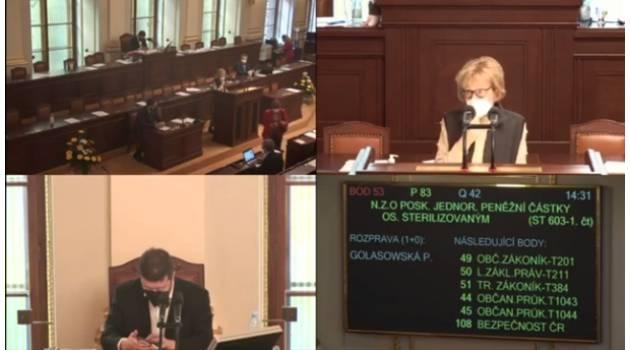Czech lower house has approved moratorium on collections agents confiscating property in people's homes due to COVID-19

Despite the fact that the state of emergency in the Czech Republic has been ongoing and Czech Prime Minister Andrej Babiš has been seeking an extension of the law authorizing the state of emergency from Parliament, it was not until 24 March that the Chamber of Deputies re-approved a previous moratorium on collections agents’ confiscations of movable items according to the law on ameliorating the impacts of the novel coronavirus called Lex Covid Justice II, which was in effect from November 2020 to 31 January 2021. Czech MP Lukáš Kolářík (Pirates) had warned that since February, when the ban on confiscating movable assets had been lifted, persons in debt who are under collections proceedings have seen their property confiscated and sold.
Kolářík also mentioned that collections proceedings have been revived to sell real estate at auction, including properties where debtors have their compulsory permanent residence registered. Such collections of movable items are usually undertaken by collections agents’ executors who first take an inventory of specific items, resgistering them and physically labelling them.
The items are then confiscated and sold at public auction. The profits of the sale are then used to satisfy creditors’ claims.
“The Chamber of Deputies proposed a law to postpone collections of movable items. We consider the undertaking of the confiscation of property by collections agents to be illogical in a situation where citizens are subjected to extensive limitations on their freedom of movement and frequently struggle with the consequences of economic decline. The law also extends protection to resources in bank accounts from being collected, at a value of up to four times the subsistence level,” Kolařík posted to social media.
The Chamber of Collections Agents of the Czech Republic has recommended its members show restraint at this time and has issued seven self-regulatory measures of its own for that purpose. Among those recommendations is the idea that inventories, confiscations and removals of movable items from the residences of debtors not be performed at this time.
The exception to the Chamber’s recommendations is cases that are called “deserving of special interest”. Despite this, executors have had to leave debtors their smartphones, tablets and computers designated for the compulsory distance learning of minors or for the performance of the debtor’s employment if the debtor is working from home during the ongoing pandemic.
Representatives of collections agents and some creditors have objected to these restrictions, arguing that across-the-board measures make no sense and that it should be left up to collections agents in the field to assess which debtors have been actually affected by the pandemic. The ban on collections does not apply to collections undertaken through wage attachments or by the court ordering a receivable to be paid from an account with a financial institution.
An amendment to a law adopted by the Chamber of Deputies in January has addressed that issue and should take effect in June. The institution of what are being called “protected accounts” is meant to end the current practice, in which the minimum amount of money that is supposed to be uncollectable is actually not completely safe in practice.
Kolářík’s amendment is meant to adjust that situation as well, though. As of last month (March), debtors whose debt payments were being confiscated from an account with a financial institution should have been able to draw an amount equivalent to double the subsistence level from that account to cover their basic needs, and as of this month (April) they will be able to draw up to four times the subsistence level.
“This bill contains three things: First, the postponement or the ban on the collection of movables until 30 June; second, the option for the debtor to withdraw an amount of money equivalent to anywhere between one and four times the subsistence minimum from a bank account under collections, which would be the equivalent of the minimum wage or the minimum pension, if you will, as it were, also until 30 June; and third, a shift in when protected accounts take effect so that there will be enough room to meet all the conditions of the banks from an IT perspective and from the perspective of the conditions vis-a-vis consumers, because banks are obligated to communicate to their customers any changes in the conditions that apply to the accounts they manage two months in advance,” Czech MP Kateřina Valachová (Czech Social Democratic Party) said during the discussion of the law’s first reading.
